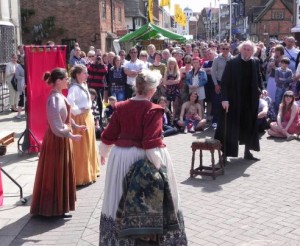
Crowds outside Shakespeare's Birthplace are entertained by a scene by Cervantes performed by actors including the RSC's Christopher Godwin
For most of us today, Spain means sun, sea and sangria, but for Shakespeare and his contemporaries Spain had less positive associations. The most powerful state in Europe, already feared and suspected, launched the Spanish Armada with the intention of invading England in 1588.
This weekend in Stratford-upon-Avon, we’re celebrating Spanish culture as well as English. The period during which Shakespeare lived was so artistically rich in Spain that it has become known as the Spanish Golden Age. It’s hardly surprising to find echoes of Shakespeare in the Spanish plays of the period (or is it the other way round?) Among the artistic achievements of this period is Cervantes’ book Don Quixote, sometimes called the first novel. Cervantes was some years older than Shakespeare, but died on the same date, though sadly not the same day because the two countries were using different calendars.
Extracts from Cervantes’ plays are being performed in front of Shakespeare’s Birthplace and this afternoon there is music and dancing in the street. For visitors to the Birthplace there is also a special display, for this weekend only, of material relating to Cervantes from the Shakespeare Centre Library and Archive, mounted by Jo Wilding. Items on display include a 1652 edition of the first translation of Cervantes’ Don Quixote, and copies of the 1728 published text of The Double Falsehood, the play which was claimed to be based on Shakespeare and Fletcher’s play Cardenio. This in its turn was based on a story in Don Quixote, which had first been published in English in 1612.
RSC Director Greg Doran’s re-imagining of Cardenio is currently playing at the Swan Theatre, and is the latest of many Spanish plays to be performed in Stratford-upon-Avon. The play has a complicated pedigree, admirably explained in its own section of the RSC’s website . In 2004 The RSC performed a whole season of Spanish plays including Cervantes’ play Pedro, the Great Pretender. Earlier performances of Spanish Golden Age plays by the RSC include Life is a Dream, performed in 1983. This wonderful play by another Spanish writer, Calderon, toys with the concepts of dream and reality, a theme in Hamlet and other Shakespeare plays.
Shakespeare was part of a much larger European cultural landscape in which cross-fertilisation flourished regardless of political differences. Shakespeare’s Birthday weekend, when people from around the world celebrate Shakespeare’s life and work, is a wonderful opportunity to look from the point of view of another of the world’s great writers.


Yes I agree that we under estimate how much Shakespeare was part of a European golden age. He was at the pinnacle of Renaissance humanism which still has intellectual force today.
Thanks for the mention Sylvia. How appropriate that Stratford basked in Spanish weather for its Cervantes Day. It was interesting to find out when I was researching for the display that Cervantes acted as a purchasing agent for the Spanish Armada (amongst his many other activities!).
The RSC programme for Cardenio manages to shorten the pedigree of the play into one breathless sentence – “Cardenio, Shakespeare’s ‘lost play’ re-imagined, after Double Falshood; or The Distrest Lovers by Lewis Theobald (1727), apparently revised from a manuscript in the handwriting of John Downes and conceivably adapted by Sir William Davenant for Thomas Betterton from The History of Cardenio by Mr Fletcher and Shakespeare (1612), performed at Court in 1612/13 which may have been based on an episode in Don Quixote by Miguel de Cervantes, which was translated into English by Thomas Shelton, first published in 1612, and here adapted and directed by Gregory Doran for the RSC”.
Greg Doran is doing another talk on the play at the Shakespeare Centre on Saturday 11th June with Oxford professor, Tiffany Stern, who doubts that Shakespeare’s Cardenio existed. Contact 01789 204016 for details.
Thanks for all this information, Jo. It’s interesting to see that the RSC had difficulty explaining it too! Thanks also for the reminder about the 11 June talk.
That 11 June talk should be good.
Have you seen “Cardenio” yet? I’m planning to go soon, but I’ve been horrified by 2011 ticket prices … although I suppose it was inevitable that they would have gone up a fair bit in the twenty-one years since I was last living in Stratford!
Yes I think there will be a lot of interest in that discussion on 11 June, so I would get a ticket soon. Cardenio is definitely worth the price of the ticket.